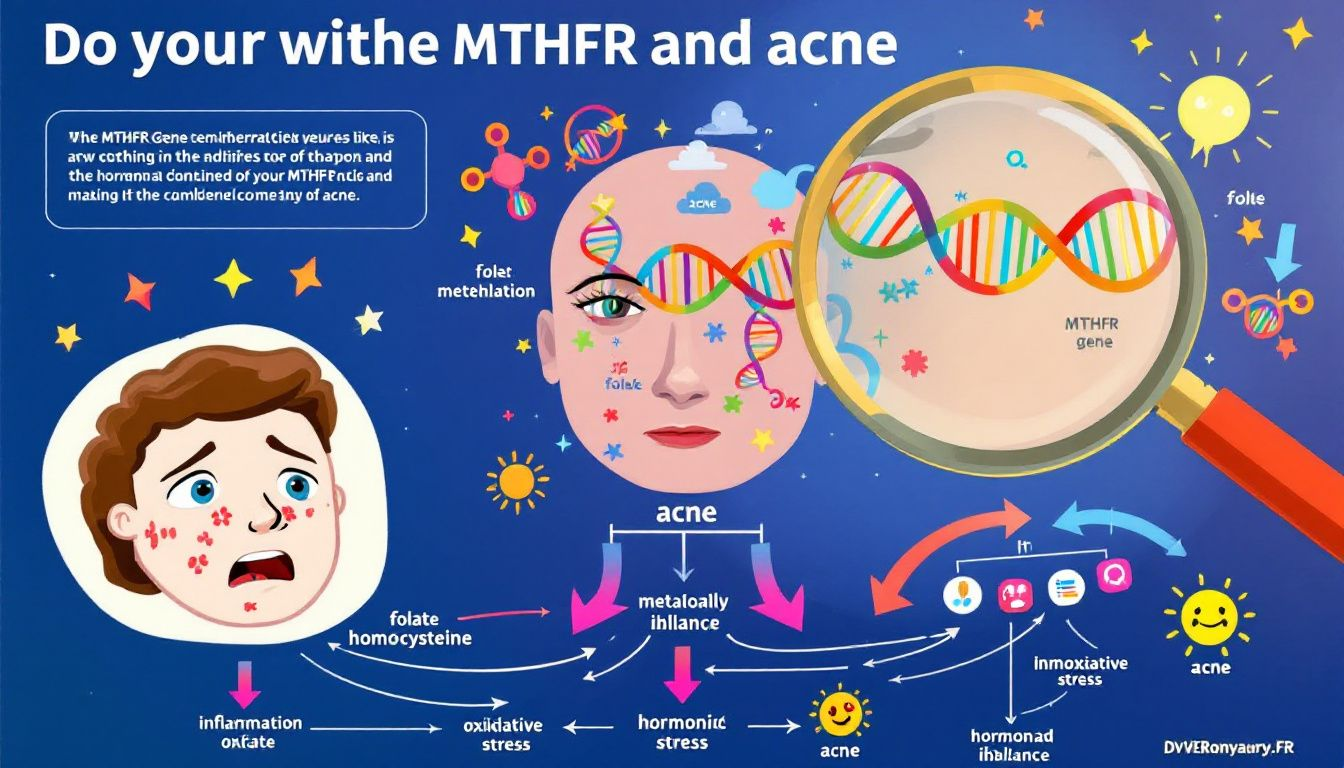Wondering how MTHFR mutations might be causing your acne? This article delves into the science behind MTHFR and acne, explaining how gene mutations affect your skin and offering practical tips for managing acne rooted in genetic predispositions.
Key Takeaways
Understanding MTHFR gene mutations is essential for managing acne, as these mutations can lead to impaired detoxification and increased inflammation.
MTHFR mutations can elevate homocysteine levels and cause hormonal imbalances, both of which contribute to the severity of acne.
Nutritional and lifestyle changes, along with professional guidance and genetic testing, are crucial in managing acne linked to MTHFR mutations.
Understanding MTHFR Gene Mutations

The role of genetic factors in our health is undeniable, and the MTHFR gene is a prime example. This gene is crucial for processing amino acids, the building blocks of proteins, and converting homocysteine to methionine, a vital amino acid for many bodily functions. Gene mutations in MTHFR can disrupt these processes, leading to metabolic issues that manifest in various ways, including skin conditions like acne.
Grasping these mutations and their impacts can aid in managing acne. The MTHFR enzyme, produced by the MTHFR gene, plays a significant role in detoxification, energy production, DNA and RNA repair, immune cell formation, and membrane repair. When this enzyme doesn’t function properly due to mutations, it can lead to a cascade of health problems, including those that affect the skin.
What is the MTHFR Gene?
The MTHFR gene encodes an enzyme known as methylenetetrahydrofolate reductase, which is essential for converting homocysteine to methionine. This conversion is crucial for proper amino acid metabolism and overall cellular function. Beyond this, the MTHFR enzyme is involved in numerous critical processes such as detoxification, energy production, and even DNA and RNA repair.
Disruptions in the MTHFR gene can lead to health issues like impaired folate metabolism. This can have wide-ranging effects on bodily functions, ultimately impacting skin health and increasing genetic susceptibility to conditions like acne.
Common MTHFR Mutations
When discussing MTHFR mutations, two variants, C677T and A1298C, stand out due to their prevalence and impact. These single nucleotide polymorphisms (SNPs) can significantly alter the enzyme’s function, leading to higher homocysteine levels and reduced detoxification capability.
Recognizing these mutations can help manage acne through genetic insights.
How MTHFR Mutations Affect Skin Health
Those with MTHFR mutations often have higher risks of skin issues due to reduced detoxification capacity. When the body struggles to eliminate toxins efficiently, these toxins can accumulate, leading to inflammation and other skin problems.
Reduced detoxification can result in skin conditions like acne. Addressing MTHFR mutations is vital for improving skin health and managing acne.
The Link Between MTHFR and Acne

Acne vulgaris is a multifaceted condition with various contributing factors, including genetics. Genetic variants play a significant role in determining who develops acne and the severity of their condition. These genetic factors can influence the inflammatory pathways and hormonal balances that are crucial in acne development.
One of the ways MTHFR mutations can affect acne is through DNA methylation, a process that can influence the expression of genes involved in inflammation and sebum production. Additionally, certain SNPs in acne studies have shown a genetic component contributing to individual acne risks.
The TGFB2 gene, for instance, controls several mechanisms related to acne development, such as inflammation and sebum production. Variants in this gene can increase the likelihood of developing acne by decreasing protein production.
Homocysteine Levels and Inflammation
MTHFR mutations, such as the C677T variant, can lead to elevated levels of homocysteine in the body. High homocysteine levels are linked to increased inflammatory responses, which can exacerbate skin conditions like acne. This enhanced inflammatory response can lead to severe acne, highlighting the critical role of inflammation in acne development.
Hormonal Imbalances and Sebum Production
Hormonal imbalances are another significant factor in acne development. Fluctuations in hormones can stimulate the sebaceous glands to produce more oil, leading to clogged pores and acne. Stress, for instance, can cause hormone imbalances, affecting estrogen, progesterone, and testosterone levels, all of which contribute to acne.
Androgens, particularly testosterone and DHT, are known to increase excess sebum production, especially in male teenagers. Recognizing hormonal acne imbalances helps identify the root causes of acne and allows for targeted treatments.
Detoxification and Skin Health
Detoxification processes are vital for maintaining overall skin health. Impaired detoxification due to MTHFR mutations can lead to the accumulation of toxins in the body, affecting skin health and contributing to acne.
Supporting detoxification processes is essential for managing acne.
Nutritional Support for Managing MTHFR-Related Acne

Diet plays a pivotal role in managing acne, particularly for those with MTHFR mutations. Incorporating a diet rich in whole, unprocessed foods can help maximize nutrient intake and support skin health.
Specific vitamins and nutrients can also promote clear skin when taken as supplements.
Folate and Folic Acid
Folate is essential for managing MTHFR mutations because it supports numerous bodily functions, including DNA repair. Foods rich in folate, such as dark leafy greens, avocados, and lentils, are crucial for supporting methylation and overall skin health.
Vitamin B12 and Other B Vitamins
B vitamins, particularly Vitamin B12, support hormonal balance and overall skin health. Individuals with MTHFR mutations may be at risk for B12 deficiency, making supplementation beneficial, especially for vegetarians and vegans.
Antioxidants and Anti-inflammatory Foods
Antioxidants and anti-inflammatory foods play a crucial role in reducing acne. Vitamins E and C, for example, possess properties that help reduce inflammation and support skin cell integrity.
Staying well-hydrated also supports detoxification, which is essential for maintaining clear skin.
Lifestyle Changes to Support Skin Health

Lifestyle changes can help manage genetic acne effectively. Regular hydration is vital for maintaining skin health and can assist in keeping acne at bay. Additionally, these changes may help to treat acne.
Additionally, diet and lifestyle factors play a significant role in influencing acne breakouts.
Stress Management Techniques
Managing stress helps maintain clear skin. Techniques such as yoga, engaging in nature, and journaling can significantly lower stress levels and improve overall skin condition.
Proper Skin Care Routine
Choosing non-comedogenic skin care products prevents breakouts. These products are specifically designed to avoid clogging pores, leading to healthier skin and reducing the likelihood of acne flare-ups.
Regular Exercise and Hydration
Engaging in regular physical activity promotes better blood circulation, which enhances skin health and appearance. Staying hydrated also helps maintain skin health by flushing out toxins from the body.
Professional Guidance and Testing

Professional guidance is vital for managing acne effectively. Personalized genetic testing can help individuals understand their predisposition to acne and guide treatment options. Consulting healthcare professionals can lead to more effective and personalized acne treatment approaches.
Genetic Testing for MTHFR Mutations
Genetic testing helps identify MTHFR mutations, which can guide treatment options and lifestyle changes for better skin health and assess genetic risk. A simple genetic test can be conducted to determine the presence of these mutations.
Consulting Healthcare Professionals
Healthcare professionals provide invaluable advice for personalized acne treatment. Dermatologists can tailor treatment plans based on genetic and environmental factors, leading to more effective outcomes.
Summary
Understanding the link between MTHFR mutations and acne opens new avenues for managing this common skin condition. From dietary changes to lifestyle adjustments and professional guidance, addressing the root causes of acne can lead to clearer skin and improved overall health.
Take control of your skin health by understanding your genetic makeup and making informed decisions. Together, these steps can help you achieve the clear, healthy skin you’ve always desired.
Frequently Asked Questions
What is the MTHFR gene and why is it important?
The MTHFR gene is vital as it encodes an enzyme that converts homocysteine to methionine, influencing detoxification and DNA repair processes in the body. Its proper functioning is essential for overall health and well-being.
How do MTHFR mutations affect skin health?
MTHFR mutations can negatively impact detoxification, resulting in toxin buildup that may increase the risk of skin issues such as acne. Therefore, addressing these genetic factors is important for maintaining skin health.
Can diet help manage MTHFR-related acne?
Yes, a diet rich in whole, unprocessed foods and specific vitamins can help manage MTHFR-related acne by supporting skin health and reducing symptoms. Focus on nourishing your body with the right nutrients for optimal results.
What lifestyle changes can help manage acne?
To effectively manage acne, focus on regular hydration, stress management, a consistent skincare routine, and regular exercise. These lifestyle changes can lead to significant improvements in your skin health.
Should I consider genetic testing for acne management?
Considering genetic testing for acne management can be beneficial as it may reveal MTHFR mutations and inform personalized treatment options. This approach could enhance the effectiveness of your acne treatment plan.

